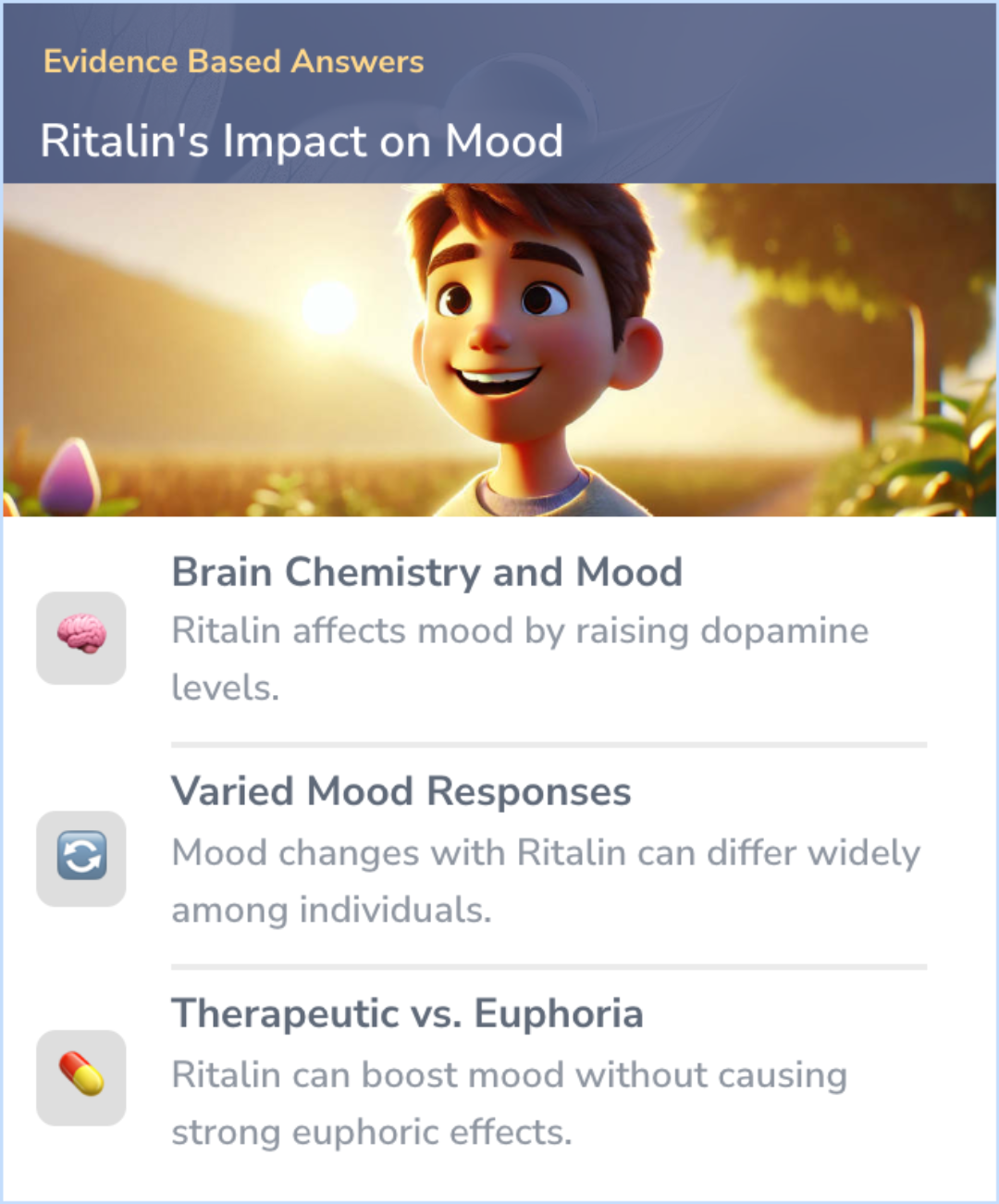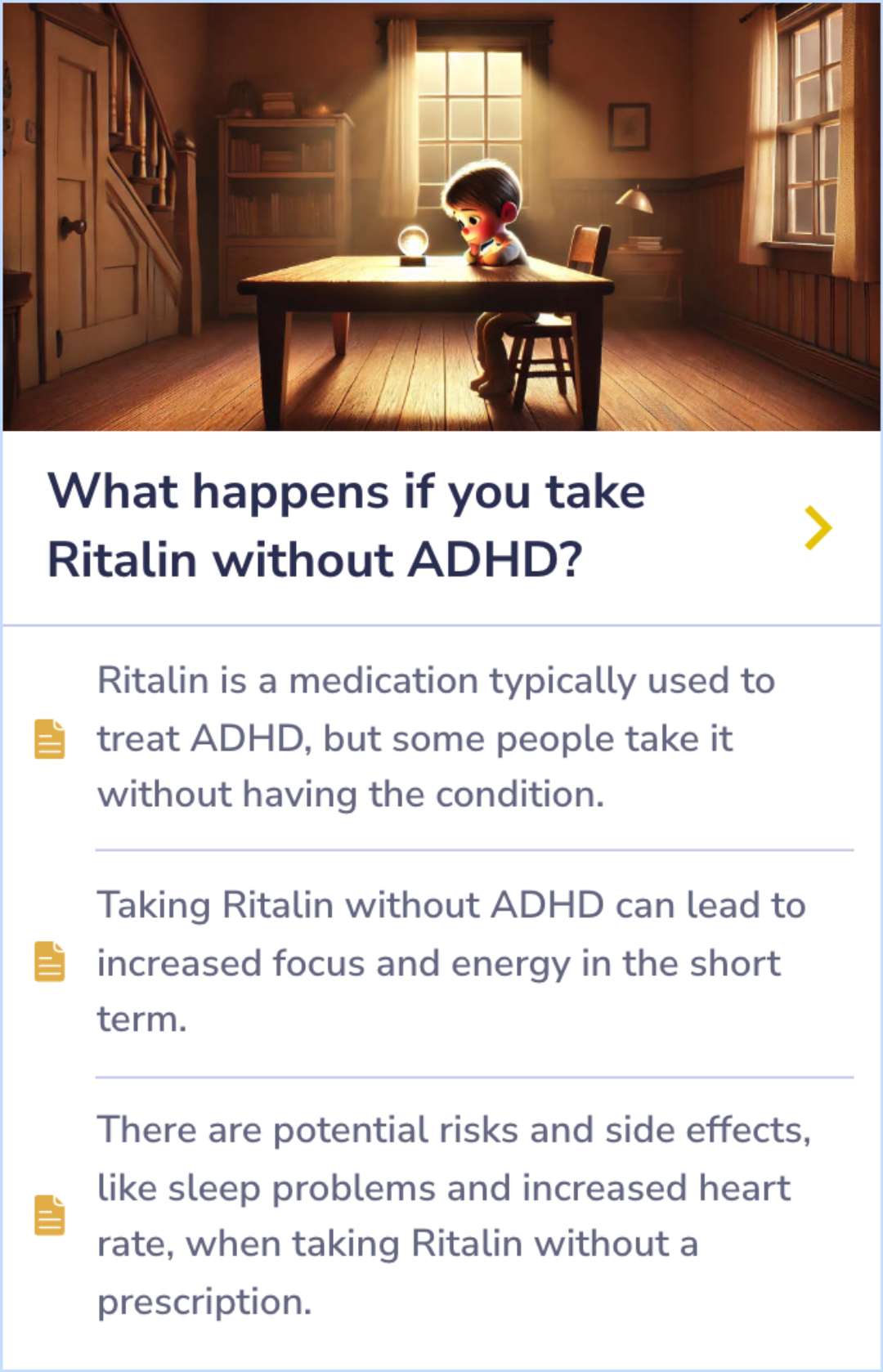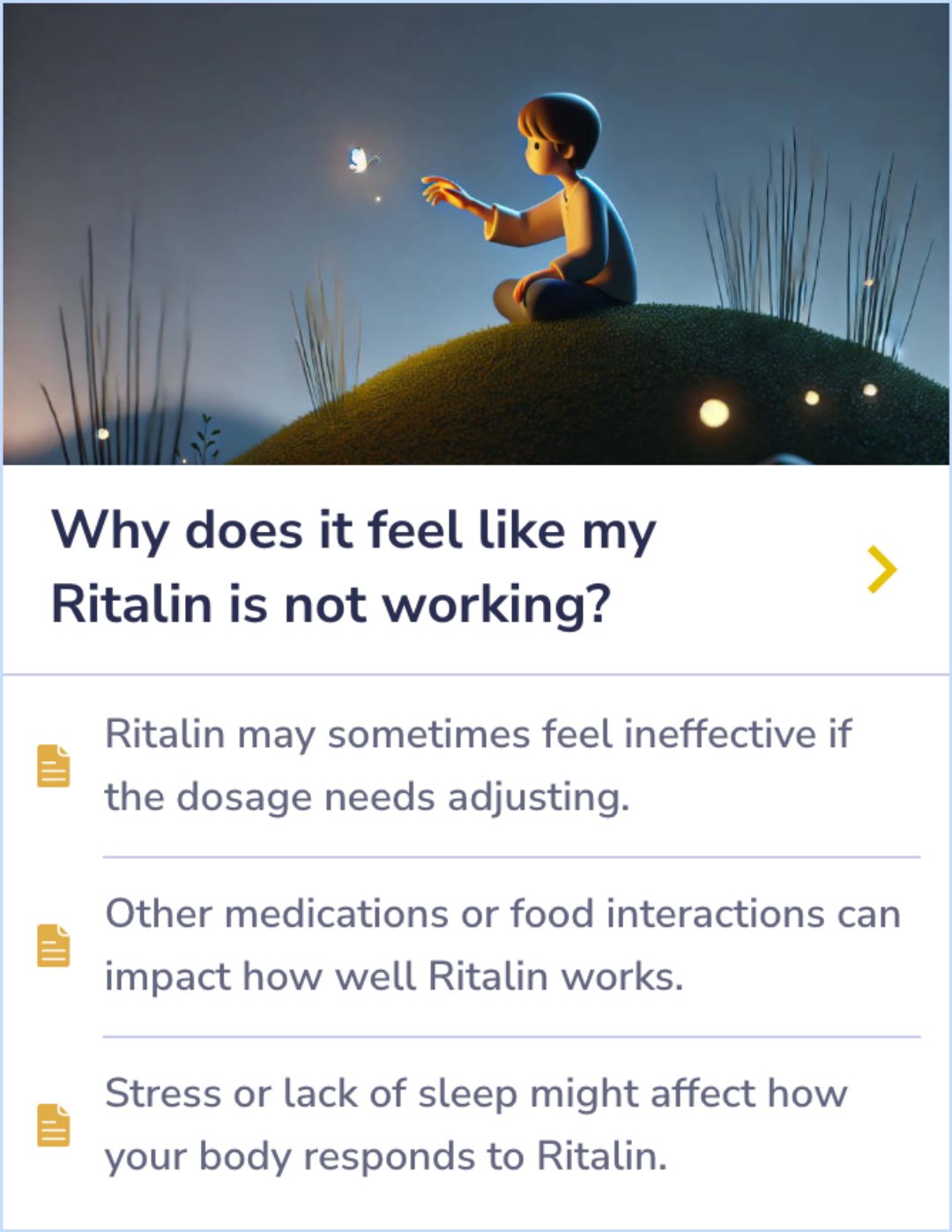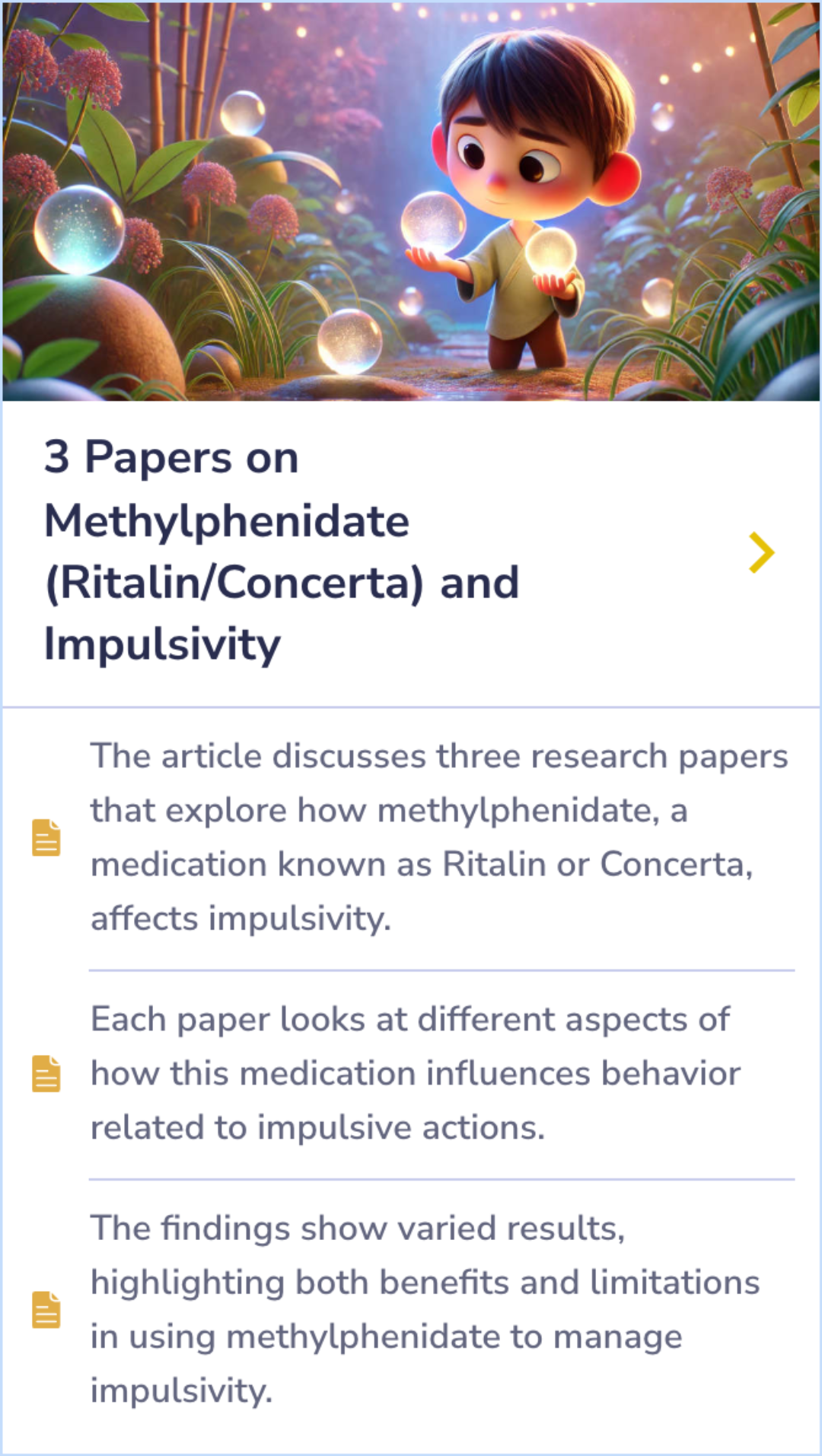Ritalin
Evidence Based Answers
Will Ritalin put me in a good mood?
Ritalin boosts brain chemicals affecting mood, shows varying mood effects based on individual differences, and can enhance mood without strong euphoria.
Published: November 8, 2024
Click to explore a section:

Ritalin affects mood by altering brain chemicals, with varied responses and mild mood boosts without the euphoria of other stimulants.
Background: Mood-related warnings with Ritalin
Ritalin can interact with existing mood issues, potentially worsening anxiety in some individuals. This effect may be due to Ritalin's influence on dopamine and norepinephrine levels, which impact mood and emotional regulation.
Those prone to anxiety or mood changes should monitor any increase in symptoms when starting Ritalin, as it may affect mood differently depending on personal sensitivity to these neurotransmitter shifts.
Those prone to anxiety or mood changes should monitor any increase in symptoms when starting Ritalin, as it may affect mood differently depending on personal sensitivity to these neurotransmitter shifts.
Personal Experiences
Perspectives: Ritalin's Effect on Mood
In discussions on whether Ritalin can improve mood, perspectives varied widely.
Some individuals reported feeling more focused and uplifted, while others noted mood dampening effects like numbness or amplified intrusive thoughts. Personal habits and individual reactions played a significant role in how people responded to the medication.
Some individuals reported feeling more focused and uplifted, while others noted mood dampening effects like numbness or amplified intrusive thoughts. Personal habits and individual reactions played a significant role in how people responded to the medication.
Reddit: u/[deleted]
For me, it makes me feel numb/apathetic, like a blank canvas, but not particularly sad or depressed...How Ritalin Influences Mood and Brain Chemistry
Ritalin influences mood by raising levels of certain brain chemicals, specifically dopamine and norepinephrine.
Dopamine is linked to feelings of pleasure and reward, while norepinephrine affects attention and alertness. This increase can enhance focus and, in some cases, mood.
However, Ritalin's impact on mood varies by individual, with some experiencing improvement, while others may not notice any significant mood changes.
Dopamine is linked to feelings of pleasure and reward, while norepinephrine affects attention and alertness. This increase can enhance focus and, in some cases, mood.
However, Ritalin's impact on mood varies by individual, with some experiencing improvement, while others may not notice any significant mood changes.
“
Source Quotes:
Methylphenidate’s therapeutic effect may be associated with its influence on multiple neurotransmitters - especially the release and reuptake of dopamine in the striatum.
Methylphenidate blocks the reuptake of two neurotransmitters, norepinephrine (NE) and dopamine, in presynaptic neurons.
Mood Improvement and Variability in Response to Ritalin
Studies suggest that Ritalin can improve mood in certain cases, such as in medically ill or depressed individuals.
For example, research on elderly and cancer patients has shown notable mood improvement when Ritalin is used.
However, Ritalin’s mood effects differ among individuals, as brain chemistry and dopamine responses vary widely.
For example, research on elderly and cancer patients has shown notable mood improvement when Ritalin is used.
However, Ritalin’s mood effects differ among individuals, as brain chemistry and dopamine responses vary widely.
“
Source Quotes:
A double-blind, placebo-controlled trial of methylphenidate in depressed, medically ill elderly patients subsequently revealed that moderate or dramatic improvement in depressive symptoms was achieved in 10 of 13 patients without serious adverse effects.
Subjects with low dopamine D2 receptor levels tended to describe methylphenidate as pleasant, whereas the subjects with high dopamine D2 receptor levels tended to describe it as unpleasant.
Euphoria Potential and Therapeutic Effects of Ritalin
Ritalin can increase dopamine levels, sometimes leading to feelings of euphoria, especially at high doses.
When taken as prescribed, however, it typically does not produce the intense euphoria associated with other stimulants like cocaine.
This difference highlights how Ritalin’s controlled therapeutic use maintains steady mood effects without significant highs, which aids in focus.
When taken as prescribed, however, it typically does not produce the intense euphoria associated with other stimulants like cocaine.
This difference highlights how Ritalin’s controlled therapeutic use maintains steady mood effects without significant highs, which aids in focus.
“
Source Quotes:
The therapeutic dosages for ADHD or narcolepsy that physicians prescribe are not harmful enough to activate the reward system within the CNS, known as the nucleus accumbens.
Methylphenidate and amphetamine increase extracellular dopamine in the brain, as do cocaine and methamphetamine, the most commonly abused stimulant drugs.
Key Takeaways
Conclusions
Ritalin influences mood by increasing neurotransmitters like dopamine and norepinephrine, directly affecting pleasure, reward, and alertness. While some individuals experience mild mood improvement, others might not see noticeable changes.
Research shows mood improvement in specific instances, such as in medically ill or depressed patients, but responses vary due to individual brain chemistry. Ritalin is not likely to produce euphoria when used as prescribed for therapeutic purposes.
Research shows mood improvement in specific instances, such as in medically ill or depressed patients, but responses vary due to individual brain chemistry. Ritalin is not likely to produce euphoria when used as prescribed for therapeutic purposes.

Evidence Summary
Short-Term Gains vs. Long-Term Risks of Ritalin Use Without ADHD
Taking Ritalin without ADHD can boost focus and energy temporarily, but it comes with risks. While users might notice heightened alertness, they may also face side effects like sleep issues and increased heart rate.
This stimulant, meant for managing ADHD symptoms, affects brain chemicals that impact mood and attention. However, using it recreationally or without a prescription can lead to unintended health concerns, particularly with the heart and sleep patterns.
This stimulant, meant for managing ADHD symptoms, affects brain chemicals that impact mood and attention. However, using it recreationally or without a prescription can lead to unintended health concerns, particularly with the heart and sleep patterns.
Evidence Summary
Factors That Impact Ritalin’s Effectiveness
Ritalin's effectiveness can fluctuate due to several factors. Sometimes, the dosage might need adjustments to meet an individual's specific needs.
Other factors, like medications or certain foods, may interfere with how well Ritalin works. Interactions with these can reduce its intended effects.
External influences, such as stress levels or lack of sleep, also play a role in how the body responds to Ritalin, impacting its effectiveness and stability.
Other factors, like medications or certain foods, may interfere with how well Ritalin works. Interactions with these can reduce its intended effects.
External influences, such as stress levels or lack of sleep, also play a role in how the body responds to Ritalin, impacting its effectiveness and stability.
Evidence Summary
How Methylphenidate Influences Impulsivity
Three studies explore methylphenidate’s effects on impulsivity, focusing on behavior and decision-making. Each study examines different ways this medication, known as Ritalin or Concerta, might influence impulsive actions.
Results vary across the studies, showing both potential benefits and some limitations in using methylphenidate to manage impulsive behavior, reflecting a complex picture of its impact on impulsivity.
Results vary across the studies, showing both potential benefits and some limitations in using methylphenidate to manage impulsive behavior, reflecting a complex picture of its impact on impulsivity.


